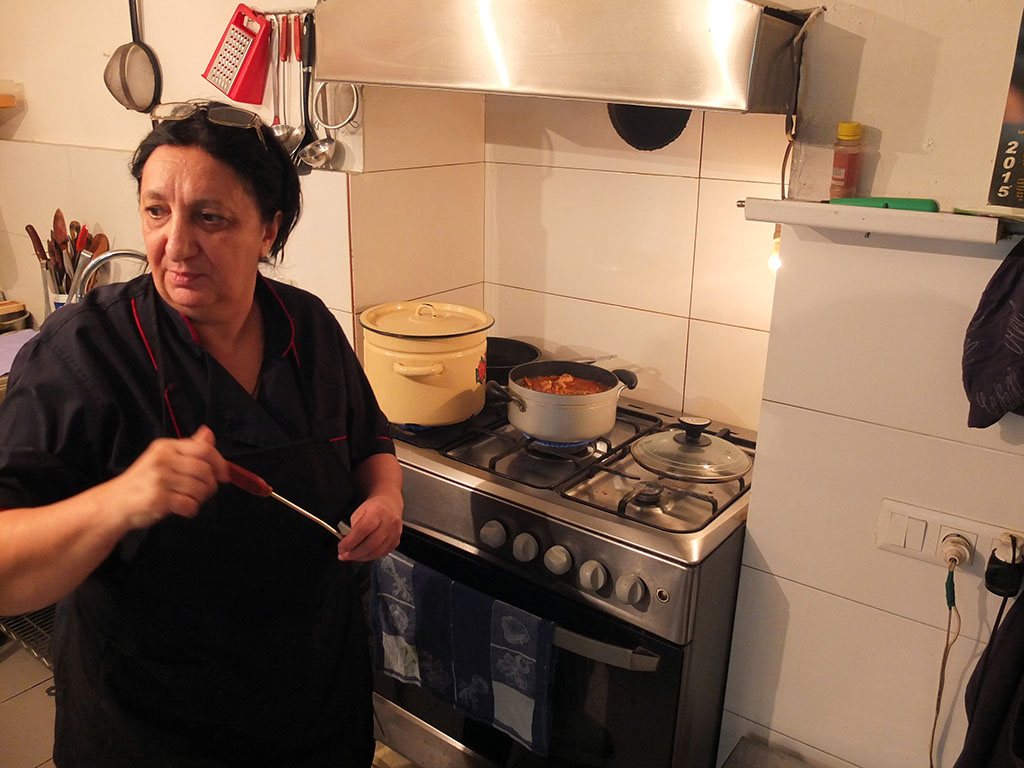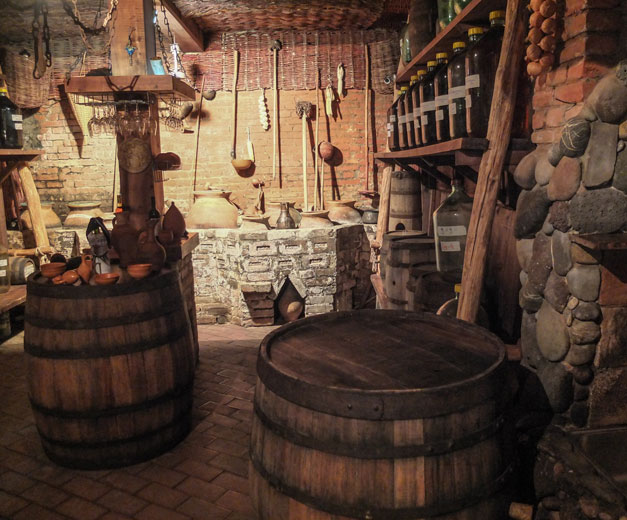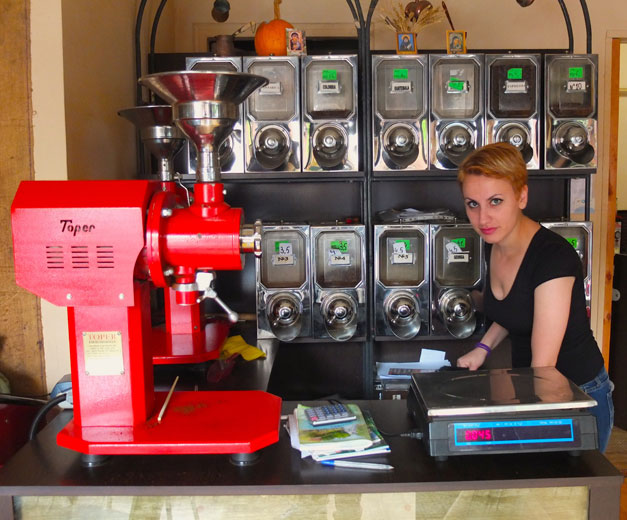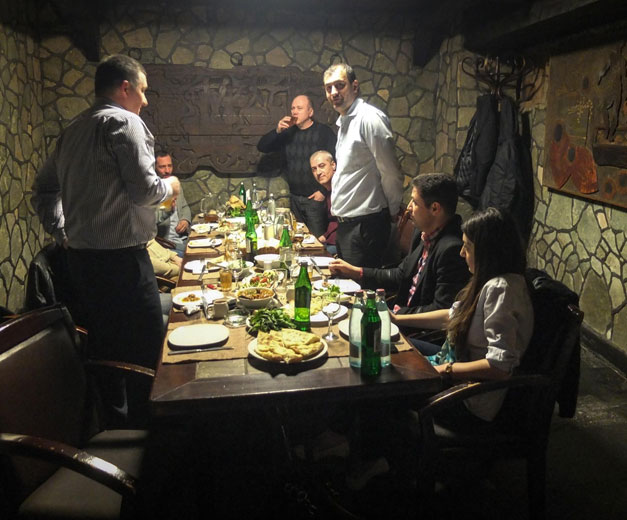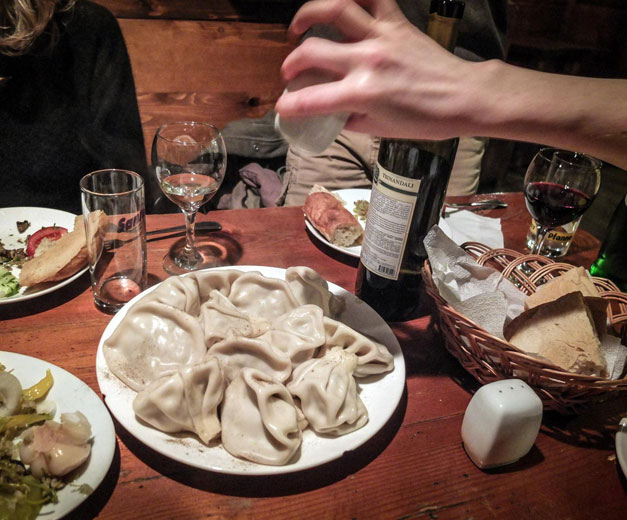We can't find the internet
Attempting to reconnect
Something went wrong!
Hang in there while we get back on track
Search results for "Paul Rimple"
Tbilisi
Amber Bar: Georgian Wine Rebel
On the left bank of Tbilisi’s Mtkvari River in the Plekhanov district is David Aghmashenebeli Avenue, a thoroughfare long associated with wallet-friendly Turkish restaurants and discount clothing boutiques. Some 15 years ago, the crumbling 19th-century buildings and huge eucalyptus trees that lined the street were crowded with people hawking everything from wooden utensils to costume jewelry, fresh produce and coffee beans labeled “Nescafé.” It was a congested, lively sidewalk bazaar of sorts that exemplified the Asiatic spirit of Tbilisi. However, a massive urban renewal project in 2011 put an end to the colorful disorder. Today, most of Aghmashenebeli is a sensible European-looking boulevard that the former President of Georgia likened to Paris, although the Turkish restaurants are still there serving up tasty Anatolian specialties.
Read moreTbilisi
Black Dog: All Species Welcome
The dog is in the car whining with a lusty craze at every cat and dog she sees. It’s shedding season and tufts of her hair puff off at every lurch and bounce in the back seat, the window smeared with her nose art. We park at the top of the street and walk down to school to pick up her six-year-old master, who grumbles that she’s hungry, starving even, and asks if we can go to “that bar.” The fridge is empty at home and “that bar” – the Black Dog – stands between us and the car. It is an excellent suggestion. The Tbilisi bar scene is a recent phenomenon in the scope of what is by tradition an intense dining culture.
Read moreTbilisi
Vino Underground: Wine Heaven
Ènek poured a rosy-colored splash of wine into our glasses, avidly explaining how this particular Aladasturi grape vine was meticulously cultivated in its native west Georgia. In a tasting ritual uncommon in Georgia, we swirled it, sniffed it and savored the flavor as it caressed our tongues. Here in the “cradle of wine,” the land where viticulture is believed to have originated 8,000 years ago, wine is customarily poured into a water glass and “tasted” in one long drag, until drained. But in this cozy cellar in the heart of Tbilisi’s historic Sololaki neighborhood, seven winemakers have come together to offer an alternative convention to winemaking and consumption. They call it Vino Underground, but we call it wine heaven.
Read moreTbilisi
The Treasures of Tbilisi's Dezerter's Bazaar
We can't think of a better way to kick off the new year than with a jolting shot of chacha chased with a sharp wedge of sheep's cheese at Tbilisi's Dezerter's Bazaar. This market is the focal point of our culinary walk in the city and is jam-packed with treasures.
Read moreTbilisi
Maspindzelo: Hangover Helper
We spent our first few years in Georgia in a whirlwind of overindulgence, hostages to the unforgiving hospitality of friends and acquaintances. Try as they might to convince us that their wine and chacha were so “clean” we would not get hangovers, there were plenty of mornings when the insides of our skulls felt like 60-grain sandpaper and our tongues like welcome mats for packs of wet street mongrels. We would hobble out of bed and stumble to the fridge and, if lucky, find two of Georgia’s most recognized hangover remedies: Borjomi mineral water and matzoni, Georgian yogurt.
Read moreTbilisi
Season's Eating: Holidaze in Tbilisi
The godzilla-sized tree of lights is up on Freedom Square and a gazillion more streamers of lights twinkle for eight kilometers down Tbilisi’s main drag, a clear, impressive indication the holiday season is upon us once again. The best thing about celebrating Christmas here is that tradition does not require us to buy a bunch of stuff for people that they don’t need. In Georgia, the real meaning of Christmas is indulgence in the gastronomic sense. Birthdays notwithstanding, the first feast of the season is on December 17, Saint Barbara’s Day. Being an Orthodox Christian country, the December 25 is only celebrated by expats and those Georgians looking for an excuse to feast.
Read moreTbilisi
Best Bites 2016: Tbilisi
Few things in life are more rewarding than eating in Georgia. However, a single night at a Georgian restaurant can also be a terribly mortifying experience. Georgians like to order big but the palate can only take so much. All the worse for guests, as they are routinely tortured into learning just how magnificent Georgian cuisine is in one sitting. This is the kind of gluttony meant to send you to hell, and it totally short-circuits your senses. You cannot contemplate the simple flavors in a piece of tender veal stewed in a tomato and pepper sauce when the table is covered with plates upon plates of pkhali, khachapuri, mtsvadi and so on while being obliged to raise one more glass of wine to wash down yet another toast.
Read moreTbilisi
Gabriadze Café: Classic Revival
When we arrived in Tbilisi in 2001, there was one café/restaurant that was a beacon to those seeking an alternative to the traditional Georgian dining experience of stark rooms and banquet tables or greasy spoons with clunky tables and little stools. It was a funky little crooked house of pure originality that served the regular dishes, but with a personal homey touch that suited the place perfectly. Although it felt like a world apart, the art installation cafe was Georgian to the bone, being the creation of Rezo Gabriadze, the renowned artist, writer, sculptor and film and stage director.
Read moreTbilisi
Wine Harvest Week: Kakheti Diary
We have each got a couple of buckets and a pair of gardening clips and we are standing in a dewy vineyard in the middle of the majestic Alazani Valley. The autumn air is brisk, fresh with the fruity smell of grapes and the sun is warm, clouds permitting. Looming northward like some godly guardian of this huge, precious grape basket is the awe-inspiring Greater Caucasus range. It is rtveli, the harvest, and here in Kakheti, families across Georgia’s chief winemaking region are busy making wine much like their ancestors have done for centuries. They pick, crush and ferment wine in kvevri, enormous ceramic urns buried into the ground, or in oak barrels. They add nothing to enhance the fermentation process, the crushed grapes are stirred several times daily until they feel the maceration process is completed. The chacha, fermented skins, seeds and stems, is separated and set aside for distillation later, while the wine is left to age until the New Year feast season.
Read moreTbilisi
Shop Bagrati: Great Balls of Cheese
We’ve seen the doleful little building a hundred times, every time we cross Tbilisi’s Dry Bridge. With the seductive words chacha, grappa and vino hand-painted on the wall enticing us like a red-light district lures lonely sailors, we would move on, thinking, “one of these days.” Then one sweltering summer night our band got a gig at the biker bar next door to the sad little building. We had a half-hour to kill until show time, and we thought, surely, one shot won’t hurt. But instead of walking into a moonshine dispensary we found a little tourist shop packed with wine, ceramic vessels and assorted knick-knacks. The real discovery, however, were three refrigerators stocked with balls of craft cheeses.
Read moreTbilisi
Art Café 144 Steps: Stairway to Gebzhalia
The 2010 makeover of Tbilisi’s old town broke the hearts of many locals and preservationists, who lamented the destruction of the neighborhood’s original 19th-century buildings and the fabrication of their cinder block replicas. The quarter hadn’t seen destruction on such a scale since the Persian ruler Agha Mohammad Khan razed the city in 1795. Instead of bemoaning the architectural tragedy, one local artist seized the opportunity to inject some positive vibrations into the precipitous hillside district by purchasing a small house underneath the 16th-century walls of the Narikala Fortress and turning it into one of Tbilisi’s coolest cafe-restaurants. Getting there, however, requires a bit of cardiovascular effort.
Read moreTbilisi
Pkhali at a Summer Favorite Outside of Tbilisi
Phkali, in spite of it's meaty appearance, is actually a vegetarian-friendly Georgian specialty of beets, ground walnuts, vinegar, onions, garlic, and herbs. This version is from Armazis Kheoba, a favorite of ours just outside Tbilisi.
Read moreTbilisi
Kakhelebi: Kakheti Calling
We were cutting grapes in a vineyard in eastern Georgia’s Kakheti region when two young men led a goat by a rope to a nearby tree and sliced its neck with a hefty hunting knife. Our lunch. They offered us a sliver of fresh raw liver with sardonic smiles, insisting it was the best part, but we passed and waited for the meat to be cut, skewered and roasted over the coals of tsalami, or vines. Served with bread, razor-sharp sheep cheese, whole tomatoes, cucumbers and rkatsateli wine, nothing could have been more Kakhetian. Since that harvest, we have been to scores of Kakhetian restaurants in Tbilisi, most of which were gratifying, but none had goat on their menus.
Read moreTbilisi
Armazis Kheoba: Down by the River
Summer in Tbilisi means sweet and sour cherries, plums, apricots, peaches, fresh figs, watermelons and, most importantly, tomatoes that taste the way God intended them to. It’s a season bursting with flavors – but there’s a hitch. Tbilisi summers are oppressively hot and humid, the thick, gritty city air leaves a mucky film on the roof of your mouth, stifling your appetite and keeping you out of your favorite local eateries. Everyone evacuates the capital in the summer, and if we can’t manage to get out of town for weeks on end, we can at least drive 15 minutes to spend an afternoon at Armazis Kheoba for some lungfuls of fresh air and beef liver mtsvadi.
Read moreTbilisi
Behind Bars: For Love of God and Chacha at Wine of Kardenakhi
It is 9 p.m. and we are packing our bags for a red-eye flight to Poland when I realize we have no chacha, Georgia’s otherworldly elixir of distilled fermented grape pulp. We never, ever travel without chacha, and there is no way we’re going to buy over-the-counter, factory-produced product – and not because it’s over-priced. Chacha is a potion brewed by the hands of masters over wood fires in hammer-battered stills sealed in a paste of dirt and ash. Without the human touch – the artistry – chacha is just a soulless, liver-grinding liquor. I make the call. Andria deals in wine, chacha and religion from a devilish little cellar in Tbilisi’s old neighborhood of Sololaki.
Read moreTbilisi
Rhea's Squirrels Café Gallery: Cheese Pie, With a Mission
The kids were playing in the park, and Dad needed a cup of coffee for the caffeine boost to keep up with his daughter. Luckily there was a café nearby – where you would least expect one. The park is a modest little playground patch in a residential neighborhood across from the funicular that hauls people up and down Mtatsminda mountain to the amusement park and restaurant above the city. The café is on the ground floor of a Communist-era apartment block, just a couple dozen paces away. It was everything a little coffeehouse should be: warm, cozy, quiet and wheelchair accessible.
Read moreTbilisi
Sasadilo Coca-Cola: The Real Thing
There used to be a state-owned publishing house in our neighborhood with a cafeteria that served a proletariat menu that included ostri (beef stew), cold slices of beef tongue and cutlets with buckwheat or mashed potatoes. It was a stolovaya, which is the Russian word for “canteen,” but a more accurate translation would be “human fueling station of protein, carbs and vodka.” It was gutted several years ago; its ghosts now haunt the dining room of a designer hotel.
Read moreTbilisi
The Khinkali Chronicles, Part II: Zakhar Zakharich
In Tbilisi, we have mornings when we wake up wrinkled and dehydrated, and as we lie in bed knuckling the sleep from our eyes, we hear an all too familiar chorus beckoning us to “bite me, slurp me, gobble me down….” That is khinkali singing, and when you hear the melody, your day has been cast. You can forget about work and responsibilities. We used to fritter away our afternoons with a platter of khinkali at Pasanauri, but when it changed owners and attitude and our beloved waitress Irma packed her bags, it was clear an era had passed. A period of pretty good khinkali at pretty good restaurants followed until we asked local filmmaker and fellow gastromaniac Levan Kitia where he goes for khinkali.
Read moreTbilisi
Citron Plus: From Stage to Table
Tbilisi’s Vake Park district is an upscale neighborhood full of designer cafés and fancy-looking Georgian-European restaurants offering mediocre grub at prices that complement the black SUVs and silver Mercedes that crowd the streets. Sure, you can find a good place that serves up the typical tasty Georgian menu at a fair price. But for original Georgian cooking with particular attention to fresh ingredients and the process of putting them together so that all the individual flavors explode in your mouth, look no further than Citron Plus.
Read moreTbilisi
Chaotic Holidays to You: The Dezertirebi Bazaar
While much of the West celebrates Christmas in an orgy of shopping for presents that climaxes after a single dinner, Georgians commemorate the season with a 30-day binge of feasts that pretty much begins on December 17, Saint Barbara’s Day (Barbaroba), and peters out by January 19, the Orthodox Epiphany (Natlisgeba). Unlike Americans, Georgians don’t consume stuff for the holidays – they annihilate food. The best, if not most chaotic, place to stock up on victuals is the Dezertirebi Bazroba (“Deserter’s Bazaar”). Located near Tbilisi’s central train station, this raw, disorganized, 2,000-square-meter warren of unprocessed agrarian pabulum is the city’s largest open-air market.
Read moreTbilisi
Best Bites 2015: Tbilisi
Editor’s note: Tbilisi was a new addition to Culinary Backstreets this year, and as we look back on all the great eating we did in 2015, we can’t help but notice that so much of it took place in the city's Sololaki area. There’s a typecast in Georgia that when somebody wants to go into business, they open up a khinkali restaurant. There is a logic to that. About a million people live in Tbilisi, a city built impetuously along the hilly banks of the Mtkvari River. And the adoration every single one of these people has for this boiled dumpling is so reverent, it is as if they see Jesus and his disciples feasting on a steaming platter of kalakuri khinkali for the Last Supper as they bite a hole into the dumpling and slurp its tasty broth.
Read moreTbilisi
Shavi Lomi: The Black Lion for Golden Guests
In the Caucasus, guests are considered gifts from God. Georgians like to call them okros stumrebi – “golden guests” – an endearment that illustrates the stature the ever-hospitable Georgians give to those they host. And whenever our own golden guests come to visit in this remote corner of the world, we never fail to entertain them in our own surrogate dining room, Shavi Lomi (the Black Lion).
Read moreTbilisi
Ezo: Just Like Mom's
The 19th-century homes in old Tbilisi neighborhoods were built in a style Georgians call “Italian Courtyards,” where through a gate or arch you enter a quad enclosed by stories of balconies shared by each family on the floor. This courtyard was the nucleus of each building, where kids safely romped around, monitored by adults from the windows above, as men contemplated domino moves at a table under a tree and women beat rugs on an iron rack in a corner.
Read moreTbilisi
Cafe Littera: Don't Call It Fusion
We are sitting under the tonic canopy of an enormous pine tree in a hidden Tbilisi garden, licking our lips over menu items that are neither European nor Georgian. When our dining companion informs us she will not share her trout tartare with adjika (highly concentrated spicy red pepper paste), we realize there will be no plate-dipping tonight. Just as we settle on our main courses, a woman in a blue chef’s jacket comes up to our table, beaming bonhomie, and asks if she can help us in any way. This is Tekuna Gachechiladze, the blue-eyed Tbilisi chef dedicated to changing the way Georgians understand their food culture. We are sitting at her latest culinary venture, Cafe Littera.
Read moreTbilisi
Sarcho: Museum-Quality Eats in Old Tbilisi
In a land with no breakfast culture to speak of, a couple slices of khachapuri and a cup of tea or coffee are all it takes to fuel you up until suppertime. If you need a snack to carry you over, you grab a pie at any one of the hundreds of khachapuri stands in Tbilisi, and no supra – feast – is complete without an “Imeretian” or “Megrelian” pie for every three people at the table.
Read moreTbilisi
Le Café du Monde: Tbilisi's Coffee Guru
With cafés popping up all over the country, from the arty boutique coffeehouses of Tbilisi to the Lavazza kiosks in villages like Zestafoni, it is easy to forget the humbler days of Georgia’s coffee culture, when an “Americano” was a chemically enhanced instant coffee powder in a stars-and-stripes-emblazoned packet added to a cup of hot water.
Read moreTbilisi
Alani: No Brainer
Last week we had a hankering for baked brains, and in Tbilisi that used to mean only one thing – a visit to Alani, the Ossetian restaurant near the sulfur baths in Old Tbilisi. The venue is named after the ancient North Caucasus kingdom of the Alans, ancestors of the modern-day Ossetians; one might think this unpopular in a country that lost a war against Ossetian separatists (and Russians) in 2008, but the fact that it is highly regarded is testament to Georgia’s paradoxically tolerant nature. Of course, it helps to have consistently quality cooking too.
Read moreTbilisi
The Khinkali Chronicles: Part 1, Pasanauri
It was in 2007, when, on a hunger-induced whim, we called a friend and asked him to meet us for lunch at a new place that had been beckoning from a Rustaveli Boulevard side street for some weeks. Tbilisi’s main drag was bereft of quality, low-priced eats, and the down-home warmth wafting down the street offered the promise of good fortune. This was before the homey little joint was known, a time when our party of two could occupy the eight-top under the window instead of the surrounding cozy, semi-enclosed booths.
Read more
























